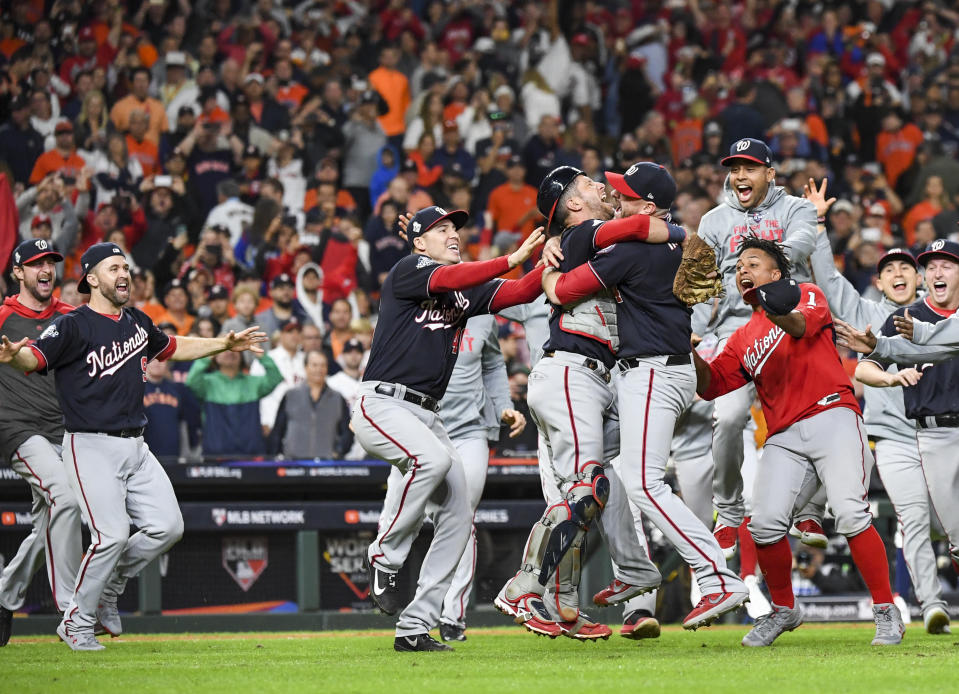We all miss real sports. Simulated seasons just make it worse
It’s not that exciting to know that someone, somewhere won the lottery. Each individual chance and personal pining for it is full of stakes and pathos. If you told me about their backstory and let me watch live as they experienced the unexpected thrill of life-changing results, it might feel like sports. But the sheer fact that even an unexpected thing happened is not compelling.
This is how I feel about simulated sports seasons.
I miss baseball terribly. I would love to go to a game and be glued to each at-bat, or turn on the TV to let the broadcast play in the background while I cook dinner, or click over to Twitter to see the GIFs and jokes emanating from a full 15-game slate, or read revelatory quotes and trenchant analysis to provide context for the unfolding events. I don’t get the same level of satisfaction out of rewatching classic baseball games because there’s no surprise. And I don’t feel anything at all reading about the results of computer simulations because there’s no magic in simply being made aware of one possible outcome. Especially if there’s no actual human effort behind the names on the screen.
As far as I understand it, there are two genres of simulated baseball — both of which (understandably) abound in this spring without any real baseball to invest in or write about. The first is where a single season is run in real time and the drama is drawn from the occurrence of unlikely outcomes. The second is where you run a statistically significant number of “seasons” to determine the most likely outcome. The first does little more than tell you that one of 30 teams might win, via a series of twists and turns along the way. The second is useful for projection purposes — although the most exciting baseball teams are those that defy logical predictions.
Consider, for instance, the 2019 Washington Nationals. Of course it’s possible for a team that starts 19-31 to win the World Series. There are enough games left, the wild card exists, math is eminently knowable. It may feel a little kooky in a cool way to see the simulation play that scenario out — sort of like if you flipped a coin 10 times in a row and got nine tails — but it doesn’t say anything about the team’s propensity to overcome adversity. Even the most narratively satisfying outcome is rendered dull if you’re simply being told that it could happen, in theory. It detracts from the sense of wonder at underdogs or outrageous powerhouses to be reminded that over enough years with enough teams, all things are not just possible but probable.

Hell, run enough simulations and in one of them the 2020 Baltimore Orioles will win the World Series. But that’s just because eventually you’ll get 10 tails in a row.
All of which is to say nothing of the actual athletes involved in generating these hypothetical results. In the simulation, Max Scherzer doesn’t break his nose taking batting practice bunts, only to grit his way through a successful start later that week with a ferocious black eye. The highest utility of any sport is as scenery for human stories.
The games give us an excuse to care about other people — their emotive exploits on the field and their quiet (or else ostentatious) humanity away from it. Rhys Hoskins’ home run off Jacob Rhame last April is forgettable as an anonymous statistic. It’s iconic because he took more than 34 seconds to round the bases in an act of nonviolent aggression in an ongoing rivalry. You could do this a million times over. Every memorable, meme-able moment that sticks with you from seasons past might as well just be a series of ones and zeros if there’s no interpersonal angst.
Baseball seasons are full of outrageous events. You know at the outset that someone will crush a home run so well-timed it seems scripted, and that a handful of position players will pitch — perhaps to humorous heroics — in an impossibly long or lopsided game. There will be blown calls and ascendant aces, web gems and bloopers, brawls and tearjerkers. What’s beautiful about the human brain is that we’re able to be emotionally caught off guard when some unforeseen iteration of these effectively guaranteed moments happen in all their physical splendor or comedy to guys we care about.
BRYCE HARPER WITH THE WALK-OFF GRAND SLAM SPRINT 🔥 pic.twitter.com/9m2sAsuyAq
— SportsCenter (@SportsCenter) August 16, 2019
Simulations, perhaps, are useful for reminding us of the possibilities inherent in every baseball season, but they do nothing to to approximate the sensation of experiencing one.
In fact, simulations actually undermine my interest in sports by emphasizing the fact that it’s just a series of zero-sum binaries. The number of permutations for 27 outs and 162 games feels infinite — simulations force us to contend with the fact that they’re not.
Fortunately for the real thing’s continued appeal, that fails to factor in the personalities of everyone involved. When baseball comes back it will not be the wins and losses — or losses and wins, those are really the only options — that draw us back in, but the unique stories of resilience from a summer no one saw coming.
Hannah Keyser is a reporter at Yahoo Sports. Have a tip? Email her at Hannah.Keyser@yahoosports.com or reach out on Twitter at @HannahRKeyser.
More from Yahoo Sports:

